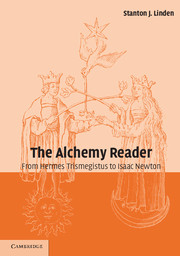Book contents
- Frontmatter
- Contents
- List of illustrations
- Acknowledgments
- List of abbreviations
- Illustrations
- Introduction
- Part I Ancient texts
- 1 HERMES TRISMEGISTUS: The Emerald Table (Tabula Smaragdina)
- 2 PLATO (c. 427-347 BC): From the Timaeus
- 3 ARISTOTLE (384-322 BC): From the Meteorology
- 4 PSEUDO-DEMOCRITUS (first or second century AD): From The Treatise of Democritus On Things Natural and Mystical
- 5 ANONYMOUS (first or second century AD): Dialogue of Cleopatra and the Philosophers
- 6 ANONYMOUS (late third century AD): From Leyden Papyrus X and the Stockholm Papyrus
- 7 ZOSIMOS OF PANOPOLIS (fl. c. 300 AD): Of Virtue, Lessons 1–3
- 8 STEPHANOS OF ALEXANDRIA (first half of seventh century AD): From The Great and Sacred Art of the Making of Gold
- 9 ANONYMOUS (eighth or ninth century AD): The Poem of the Philosopher Theophrastos Upon the Sacred Art
- Part II Islamic and medieval texts
- Part III Renaissance and seventeenth-century texts
- Glossary
- Bibliography
- Index
7 - ZOSIMOS OF PANOPOLIS (fl. c. 300 AD): Of Virtue, Lessons 1–3
Published online by Cambridge University Press: 05 October 2014
- Frontmatter
- Contents
- List of illustrations
- Acknowledgments
- List of abbreviations
- Illustrations
- Introduction
- Part I Ancient texts
- 1 HERMES TRISMEGISTUS: The Emerald Table (Tabula Smaragdina)
- 2 PLATO (c. 427-347 BC): From the Timaeus
- 3 ARISTOTLE (384-322 BC): From the Meteorology
- 4 PSEUDO-DEMOCRITUS (first or second century AD): From The Treatise of Democritus On Things Natural and Mystical
- 5 ANONYMOUS (first or second century AD): Dialogue of Cleopatra and the Philosophers
- 6 ANONYMOUS (late third century AD): From Leyden Papyrus X and the Stockholm Papyrus
- 7 ZOSIMOS OF PANOPOLIS (fl. c. 300 AD): Of Virtue, Lessons 1–3
- 8 STEPHANOS OF ALEXANDRIA (first half of seventh century AD): From The Great and Sacred Art of the Making of Gold
- 9 ANONYMOUS (eighth or ninth century AD): The Poem of the Philosopher Theophrastos Upon the Sacred Art
- Part II Islamic and medieval texts
- Part III Renaissance and seventeenth-century texts
- Glossary
- Bibliography
- Index
Summary
Zosimos of Panopolis has a much stronger claim to historical reality than any of the other early alchemical writers introduced thus far. He is thought to have lived in the late third and early fourth centuries AD and, like the author of the Dialogue of Cleopatra and the Philosophers, to have been deeply influenced by the tangle of religious and philosophical elements that constituted the culture of Alexandria at that time. Garth Fowden speaks of him as “a man of strong spiritual urges and little conventional scholarship, who moved in an eclectic milieu compounded of Platonism and gnosticism together with Judaism and … the ‘oriental’ wisdom of Hermes and Zoroaster” (120). Although Zosimos and his “spiritual sister” Theosebia are assumed to have had practical experience in alchemical laboratories, they also believed that its primary goal was purificatory and contemplative, esoteric not exoteric. This is apparent in the broadly allusive Visions, where Zosimos's syncretic religious and intellectual environment is reflected in dense allegory, enigmatic expression, and obscure symbolism. In the selection that follows, the dream vision itself – with its motifs of transformation from body into spirit, torture and violence, death and regeneration, and cryptic humanoid figures – has made Zosimos a challenging subject for the Jungian analyst no less than for the student of alchemy or of the fantastic.
- Type
- Chapter
- Information
- The Alchemy ReaderFrom Hermes Trismegistus to Isaac Newton, pp. 50 - 53Publisher: Cambridge University PressPrint publication year: 2003



